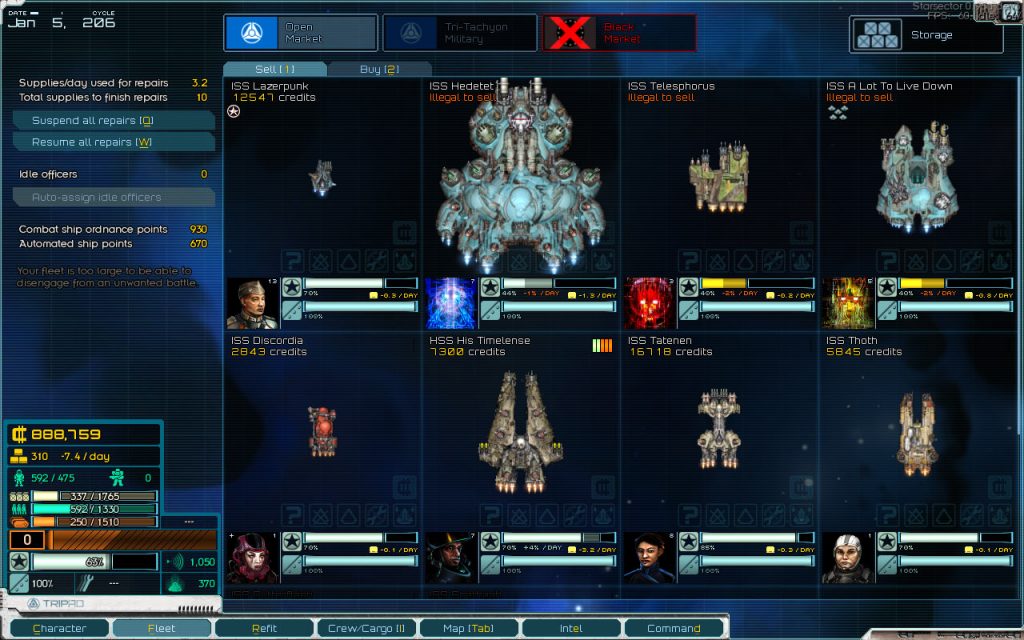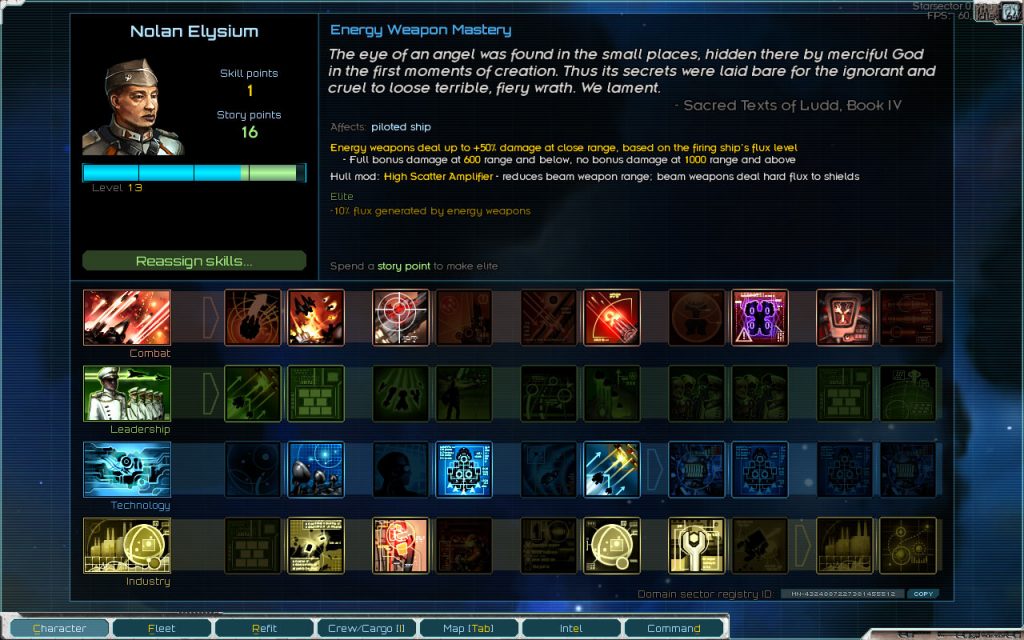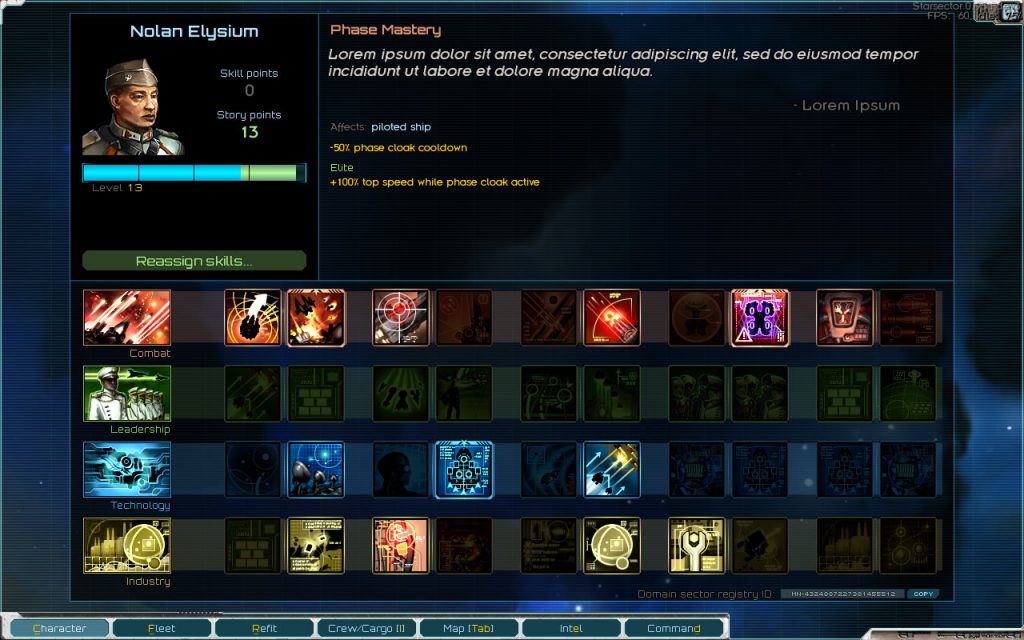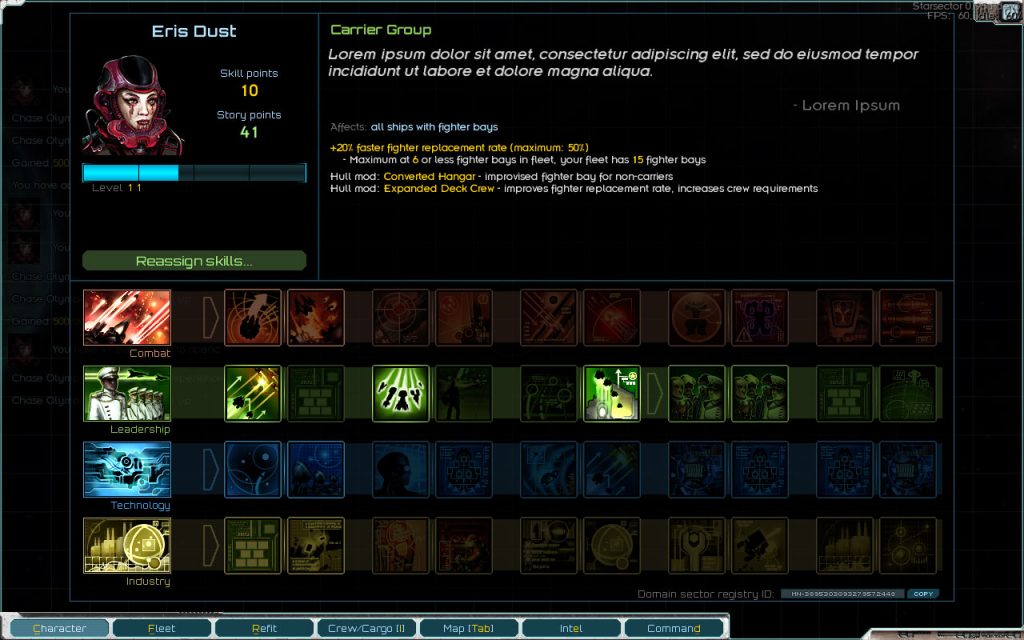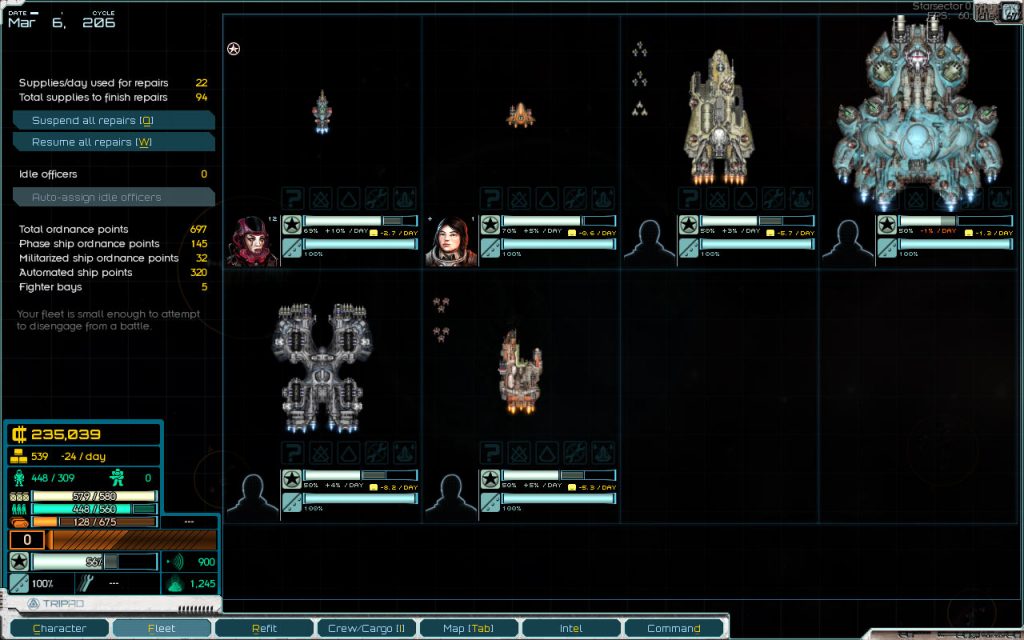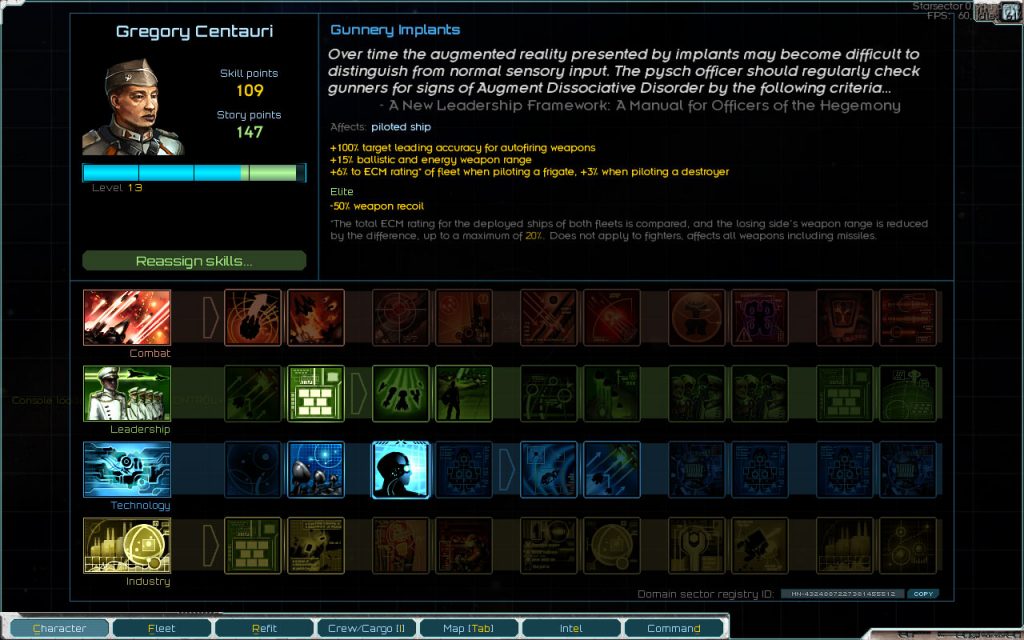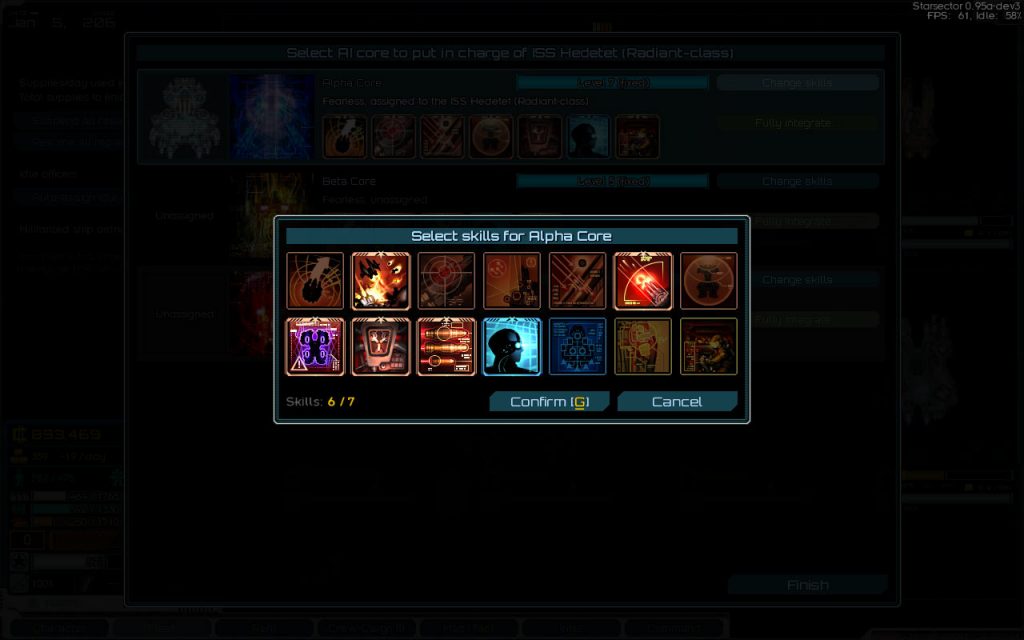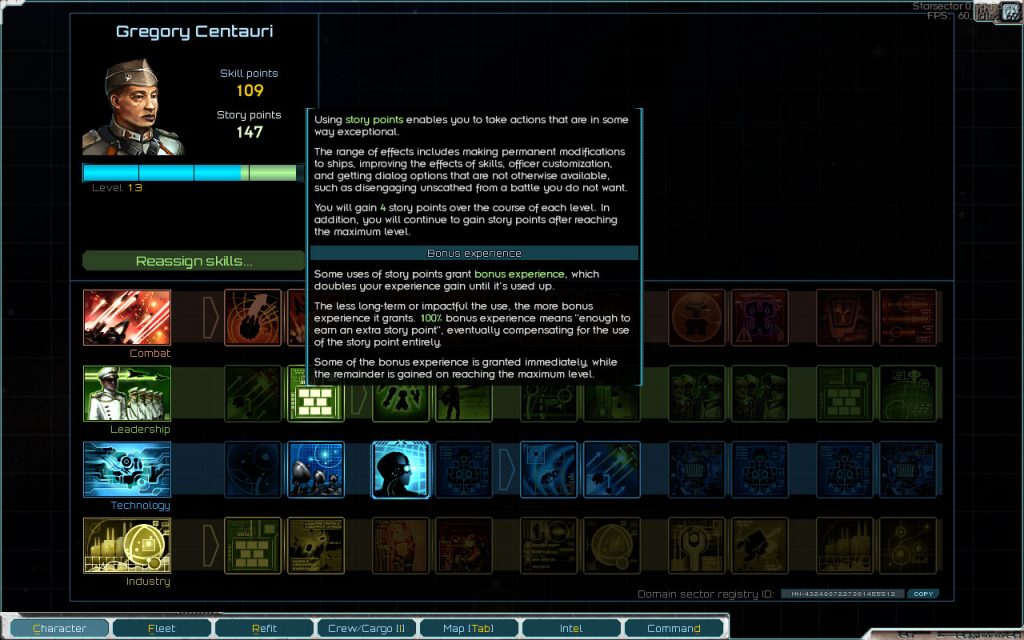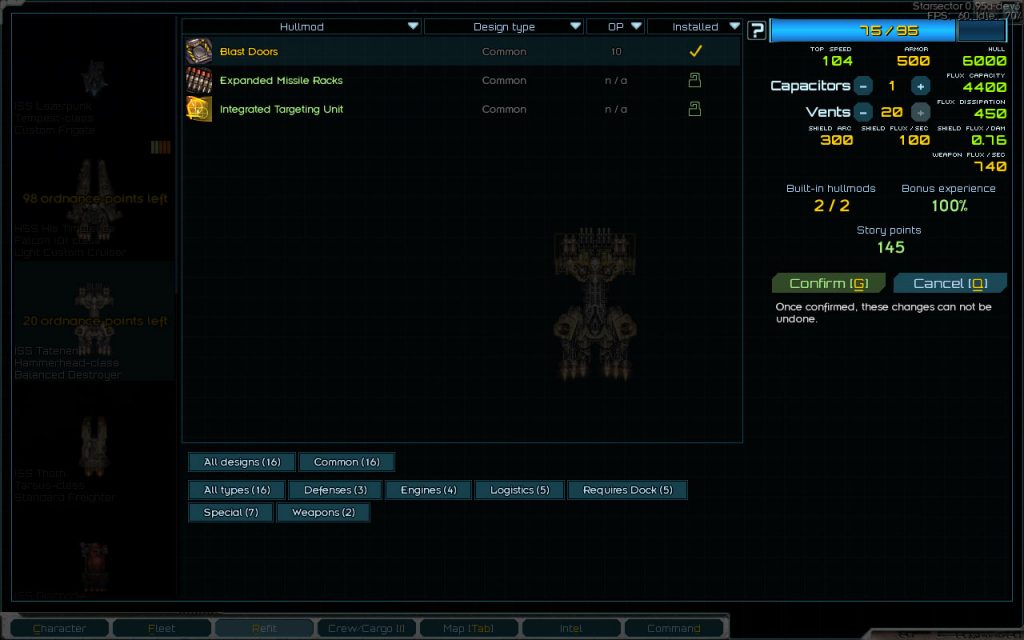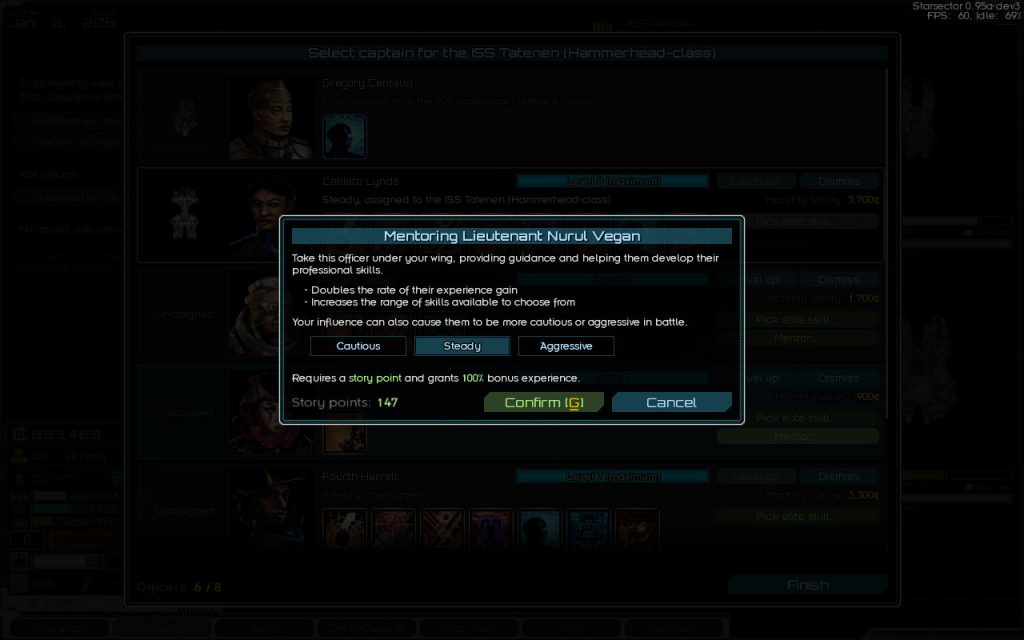Skills and Story Points
I’ve wanted to update the skill system for a while, but that’s part of the challenge with early-access style development – if you update something too early, you might have to update it again, when yet more things change and make that part not-quite-fit once more. With how many parts of the game the skill systems has tendrils into, it wasn’t something I wanted to do more than once.
Now, finally, the game is in a place where I can do that – I’ve got a good overview of what I actually want from the skill system, the number of unknowns is low, and most of the unknowns are probably known.
(Please note – some of the graphics and text in the screenshots to follow are placeholders.)
So, what are the goals of the skill overhaul? First and foremost, the skill system should increase the replay value of the game – that is, depending on what skills are picked, the player should be able to explore new ways to play the game.
Previously, I’d thought of it in terms of offering the player choices – and we still want that – but it makes sense to look at why we’re offering these choices so that they can be crafted with that goal in mind.
The second goal is to make the system more approachable. Currently, you can pick any skill you want – imagine, as a new player, being presented with some 30-odd choices of what skill to get, while you’re still figuring out how to play the game. This isn’t just a new-player-oriented feature, however. I think reducing the number of options at any given point will also make for more impactful and considered choices for players of any skill level.
Finally, updating a system is a great time to simplify it, so that’s a goal as well.
New System Overview
There are 4 “aptitudes” – Combat, Leadership, Technology, and Industry; same as before. Now, however, these are just a way to organize skills, and you don’t put points into them directly.
Each aptitude has 10 skills, arranged in 5 tiers of 2 skills each. At each tier, you can pick one – and only one – of the two skills; this costs a skill point and unlocks the next tier. Once you’ve reached the fifth tier, you can wrap around and pick up the other skills in the aptitude, if you really want to dedicate the majority of your points this way.
Skills don’t have levels – you unlock all of the skill’s effects with the point you spend. Combat skills – that is, skills that improve the ship you’re piloting – are an exception to this. In addition to the base effects, each combat skill also has an “elite” effect, which is unlocked by spending a “story point”. More on those in a bit!
Skills can be reassigned at any time (again, at the cost of a story point). A few skills are permanent and can’t be reassigned; these are ones with effects that would either leave the game in an invalid state if the player had the skill and subsequently didn’t, or just ones that make it optimal to get the skill, use it, and then refund it.
The maximum level is 15, with 1 skill point per level – enough to get to the top tier in 3 of the 4 aptitudes, though that’s not necessarily how one might want to spend them.
This setup helps with making the system more approachable – instead of 40 choices at the start, we’ve got two for each aptitude, for a total of 8 possible places the first skill point can go. That’s still a lot, but even a new player might have some idea of what kind of character they want to build, which would nudge them towards a specific aptitude – and its pair of tier 1 choices.
Now, what about adding replay value?
Specialization
Previously, I’ve been hesitant to have skills with effects that are content-specific in what they do – for example, improving a specific ship type, or a specific weapon type. The reasoning was that it feels bad to have points in a specialized skill that you’ve since drifted away from using. Being able to refund and reassign skills largely takes care of this concern.
Thus: most skill tiers offer a choice between a generic skill and a specialized one. We always want to offer a “generically good” choice – if both are specializations, with only two options, neither might be one the player cares to specialize in. The generic choice is always weaker than the specialized one – otherwise, there’s no reason to specialize.
Despite being weaker on paper, the generic choice is often desirable anyway – it’s a way to boost your other specializations. If you just picked specializations, you’d end up with a bunch of skills that don’t work together well. For example, if you get bonuses to carriers and phase ships – there aren’t any ships that are both.
Specialization is what increases replay value, by either opening up entirely new playstyles or just by making some options powerful enough to lean on them during a playthrough, changing one’s experience from the “normal” one.
For example, at tier 4 in Combat, the player has a choice between Shield Modulation (which improves shields; these are ubiquitous enough for it to be a generally-good option) and Phase Mastery (which improves phase ships, with an elite bonus that makes them move twice as quickly while phased).
Tier 1 Leadership offers a choice between Weapon Drills (an across-the-board bonus to damage dealt) and Auxiliary Support (which lets the player make a limited number of civilian ships very combat-effective). Tier 4 offers a choice between increasing overall combat readiness (“Crew Training”) and greatly increasing the fighter replacement rate on a few carriers (“Carrier Group”).
That brings up another point – just how can we limit the bonuses to “a few” carriers, rather than all the carriers in the fleet? This is critically important; if specialization leads to mono-fleets, that’s a problem – instead of encouraging variety, it’s doing the opposite. Fleetwide specializations should be “use some of this in your fleet” rather “use only this in your fleet from now on, because it’s got stat bonuses now and it’s better than anything else”. We also want the bonuses from specializations to be large enough to be fun and exciting, so it’s all the more necessary to limit them effectively.
Effect Scaling
The solution is to scale the effects of all fleetwide skills based on the ships they affect. For the Carrier Group skill, for example, the effect scales based on the number of fighter bays in your fleet. More than 6 and sure, there’s still a bonus – but you’re being less efficient overall, with each carrier you field being weaker than it would be if there were less of them total.
Other skills generally scale based on the number of ordnance points on ships they affect. For example, the effect of Weapon Drills depends on the total number of ordnance points on combat ships in your fleet.
A few fleetwide skills, instead of scaling, only apply to ships with officers in command.
The fleet screen shows whatever fleetwide totals are relevant for the skills you’ve picked – the total number of fighter bays, combat phase ship ordnance points, and so on.
Overall, this approach lets us have sizeable specialization bonuses that encourage fleet variety instead of doing the opposite. Since non-specialization skills also scale their effects (albeit at much higher point values), it also rewards smaller fleets by making them more efficient.
Encouraging the Use of Smaller Ships
This is a bit of a minor point – in the game as it currently is, the use of smaller ships, and especially frigates, drops off as the game goes on and larger ships take over. Some specialist frigates remain useful, but overall frigates become very limited. While this isn’t a huge problem – I think this generally makes sense – it would still be nice to encourage the use of smaller ships to extend their usefulness.
This takes several forms. The “Wolfpack Tactics” skill just directly increases the combat power – and endurance – of frigates. Several other skills make deployed frigates grant bonuses to all of the deployed ships, in effect making all frigates specialists and carving out more of a niche for them in larger fleets. For example, Gunnery Implants on frigates (and destroyers) grants a bonus to the fleet’s Electronic Warfare rating. Presumably there’s some spare processing capacity to dedicate to this when the officer with the implants is on a smaller ship.
Coordinated Maneuvers makes frigates and destroyers – with officers only – increase the nav rating of the fleet, granting all the ships increased speed. There are also a few other skills with effects that tilt them to slightly favor smaller ships.
In addition, that base number of officers is now 8 (up from 4), meaning you’ve got a lot more to spare as far as using them in smaller ships, where they generally make less of an impact. The maximum number of officers (that is, after taking the Leadership skill that increases it) is still 10, as before.
Automated Ships
An interesting example where everything comes together is the Automated Ships skill – the tier 5 Technology specialization that allows you to recover and use (mild spoilers) Derelict and Remnant droneships found in various star systems outside the core worlds.
In the player’s fleet, these have a hefty penalty of -100% to combat readiness, making them entirely useless by default. If you deploy a ship like that, it’ll heavily damage itself just from the strain.
However, the Automated Ships skill can counter this penalty entirely – or less than entirely – depending on how many automated ships the player decides to have in their fleet. One battleship, with moderate combat readiness? A couple of cruises? A pack of frigates? All viable options.
The player can’t use these as their flagship – the ships are designed to be a bit more powerful and flexible than usual, and would be slightly broken in player hands. But, ships without officers are weak – and if you could assign an officer, the explanation for why it couldn’t be the player would be strained.
So, naturally, AI cores are the answer there – you can assign them to command automated ships for you. You can’t level them up like officers – they come with a fixed number of skills – but to really differentiate them, you can freely reassign their skills at any time…. and their skills are all elite, to boot.
Story Points
When first thinking about the skill changes, a maximum level of 15 made sense – 15 points, 3 aptitudes taken to tier 5, it all lines up. But that’s a low level just as far as the number goes, and there are two scenarios. Either the player reaches it very quickly – and from that point on, there’s no progression. Or, it takes a long time to reach it – and the interval between gaining points feels like too long.
Then there were the elite skills – the idea for those being to give the player something that makes them special, bonuses that are more easily available to the player than they are to either allies or enemies. If you get the “elite” bonus simply for being the player and investing the skill point, it feels a bit off – and it also doesn’t feel like the elite status is really earned.
So: story points are “do something cool” points. They let the player do things that would be overpowered or game-breaking if the player could just do them whenever, or even at a regular resource cost.
I’ve been kicking the idea around for a long time. Ultimately its roots are in the “destiny” dice from an old Star Wars pen and paper RPG – but it never quite fit into Starsector. That is, it would’ve been an external thing tacked onto the design instead of being an integral part of it.
(“Destiny dice” were something you’d get at the start of each session, the number of them being dependent on your class, and you could add them to any roll you really wanted to succeed – even after making the roll. Making sure the story stayed on track, basically, by not failing anything that’s absolutely critical. … or wasting them on winning an arm-wrestling match at a cantina, not that I’d ever do something like that.)
Coming back to Starsector – now, instead of being a solution in search of a problem, story points solve the design problems we’ve got, and open up a lot of design doors besides.
You get 4 story points per level. Or maybe 2. Point being, you get more of them than you get skill points, so they keep things flowing between level-ups. You also keep gaining story points after reaching the maximum level, so there’s progression beyond that.
What exactly are they used for, then? If you’ve been keeping track, making skills elite and reassigning skills are two uses I’ve mentioned so far.
The key use – against which all other uses are measured and balanced – is making hullmods on a ship permanent, at a cost of one story point per hullmod (and, currently, a maximum of 2 of these per ship).
Other uses – that are already implemented – include:
- Mentoring an officer, granting them increased experience gain, more skill choices on every level-up, and potentially affecting their personality slightly
- Making one of an officer’s skills elite
- Fully integrating an AI core into a ship, making it unremovable and granting it an additional skill
In addition (and I’ve got a bit of a list to go through), uses would include taking all sorts of actions in the campaign that you would not normally be able to. For example, executing “special maneuvers” to disengage from a fight you don’t want, making a derelict ship recoverable when it otherwise wouldn’t be, or just avoiding a cargo scan while carrying contraband.
The general idea here is that “story” options in the campaign would either smooth out the flow of the game, letting you avoid a situation that would result in reloading a save – or grant you some long-term benefit.
Bonus Experience
So, why wouldn’t players just hoard all their story points for exclusively the “best” uses? Wasting a free hullmod on a ship by instead getting away from a battle you didn’t want could in itself be a reason for reloading the game. And even within making hullmods free and permanent, wouldn’t putting them on smaller ships be a waste of story points that could improve more powerful ships instead?
The answer here is bonus experience – the less long-term-impactful the use of a story point, the more bonus experience it grants. Bonus experience doubles the rate of your experience gain until it’s used up. So, for example, installing a permanent hullmod on a frigate grants 75% bonus experience – which means “enough to earn 75% of a story point” – meaning that in the long term, it only costs a quarter of a story point.
A more “frivolous” option – such as disengaging from a fight for free – would grant 100% bonus experience, making it entirely free in the long term – so it wouldn’t feel like a permanent hit. Other actions – such as making skils elite, reassigning skills, or building hullmods into capital ships – grant no bonus experience and are in that sense story point “sinks”.
Impact
Story points are perhaps the biggest mechanical addition of the skill overhaul. One of the things I like is that they can encourage the player to think about the game in terms of creating their own story by selecting the “exceptional” things they do.
It’s not even something where the range of story-point choices is wide enough to tell the player’s story through that alone – rather, it’s more of an aid in getting into that mindset, where you’re telling yourself a story about what your character is doing in-game. I think that’s particularly important for a sandbox game, where you have a lot of freedom.
The other aspect of it that I’m extremely excited about is all the design options it opens up. Imagine if “build a permanent mod into a hull” didn’t use story points – fair enough, we could probably make it work somehow – but it would probably involve some custom-made mechanics to limit it in some way. With story points, the limiting mechanic is in place, and can be used for just about anything, making these kinds of things so much easier to add.
For example, being able to “mentor” an officer, or to “fully integrate” an AI core into a ship – both were things that just occurred to me, in a “wouldn’t it be cool if you could do this” way. And it took something like an hour to add, in each case! As much as story points let the player do cool things, they let me do cool things, too.
Comment thread here.
Tags: campaign, game design, known unknowns, mechanics, skills, story points
